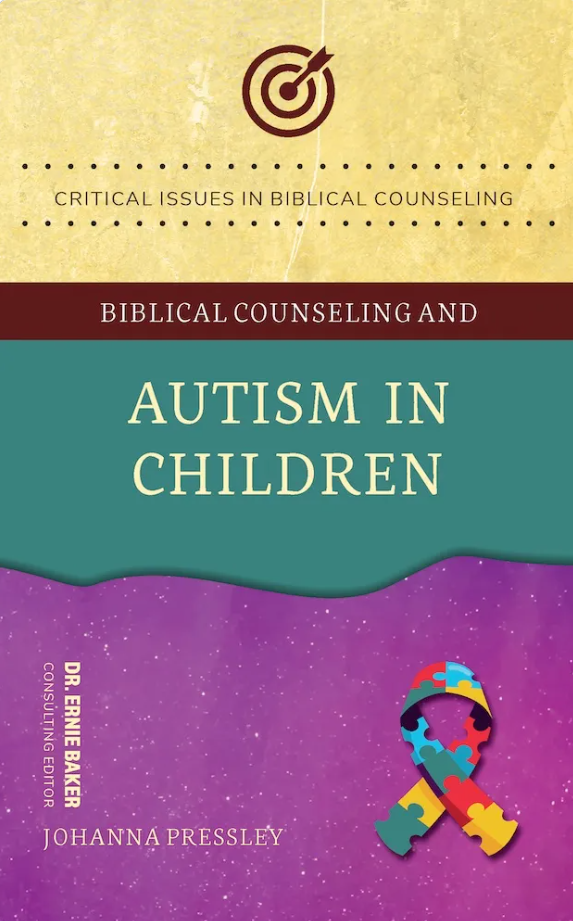A Much-Needed Resource:
Biblical Counseling and Autism in Children
As biblical counselors, we’ve all encountered families wrestling with challenges that seem to fall outside the scope of our typical training. When parents walk into our offices describing behaviors they don’t understand in their children, when marriages strain under the weight of miscommunication, when churches struggle to know how to love families affected by autism, we need more than good intentions. We need biblical wisdom paired with practical methodology.
Johanna Pressley’s new book, Biblical Counseling and Autism in Children, fills a significant gap in our biblical counseling resources. This isn’t theoretical work written from a distance. Pressley writes as a mother who has walked through the confusion, fear, and ultimate hope that comes when autism touches your family personally. Her approach combines the theological depth we expect from biblical counseling with the kind of practical tools that actually help families navigate daily challenges.
Why This Book Matters Now
Our counseling offices are seeing more families affected by autism than ever before. Parents arrive overwhelmed by conflicting secular approaches that either pathologize their children or dismiss the reality of genuine developmental challenges. They’re caught between medical models that reduce their child to a set of symptoms and neurodiversity paradigms that reject the possibility of meaningful growth and change.
Meanwhile, many biblical counselors feel unprepared to serve these families well. We know Scripture is sufficient, but we may lack understanding of how autistic-like traits affect communication, learning, and behavior. Pressley bridges this gap by teaching us to recognize these traits not as barriers to biblical counseling, but as factors that require us to adapt our methods while maintaining our theological convictions.
Practical Methodology That Actually Works
What sets this book apart is Pressley’s emphasis on creative application of biblical truth. She introduces concepts like “yoked projects” that help visual thinkers grasp abstract spiritual concepts through concrete activities. Her approach to identity formation moves beyond telling children who they are to helping them experience their biblical identity through the actions and attitudes of those around them.
The book provides specific tools like the “fire drill” for managing meltdowns before they happen, the “string of trust” exercise for building parent-child relationships, and interpretive grids that help parents discern between physical weakness, lack of training, and willful sin. These aren’t secular techniques with Bible verses attached. They flow from careful biblical thinking about how to shepherd hearts that process the world differently.
Challenging Cultural Assumptions
Pressley doesn’t shy away from critiquing both the medical model and the neurodiversity paradigm where they conflict with Scripture. She demonstrates how a biblical worldview offers a better framework than either secular approach. Her chapter on the challenges of formal diagnosis is particularly valuable, helping counselors guide families through decisions about assessment and intervention with eyes wide open to both benefits and potential pitfalls.
Her discussion of identity terminology is especially helpful. Rather than accepting cultural labels as neutral, she shows how biblical, actionable terminology can reshape how families think about themselves. Terms like “ear bender,” “word chooser,” and “fire tamer” communicate both capability and progressive growth in ways that build hope rather than resignation.
Addressing the Whole Family
One of the book’s strengths is its recognition that autism affects entire family systems. Pressley addresses the unique challenges marriages face when one spouse displays autistic-like traits, the impact on siblings, and the crucial role of church community. Her emphasis on parenting in unity while maintaining biblical standards offers hope to couples who may feel divided by their different perspectives on their child’s behavior.
The book’s approach to church involvement is particularly refreshing. Rather than encouraging families to seek specialized resources outside their local church, Pressley equips church leaders and biblical counselors to serve these families with confidence. She demonstrates that churches don’t need to outsource the care of families affected by autism to be faithful shepherds.
A Compassionate Voice from Experience
Throughout the book, Pressley’s personal experience with autism in her own family comes through clearly. This isn’t cold methodology but wisdom born from years of learning to understand and love family members who think and communicate differently. Her compassion never undermines her commitment to biblical truth and genuine transformation.
She writes with the voice of someone who has wrestled with fear, made mistakes, and discovered the sufficiency of Scripture through trial. This authenticity makes the book accessible to struggling parents while maintaining the theological rigor that biblical counselors need.
Filling a Crucial Gap
Biblical counseling has developed sophisticated approaches to many complex issues, but autism has remained largely unaddressed in our literature. Pressley’s work fills this gap with a resource that is both biblically faithful and practically useful. She demonstrates that we don’t need to choose between loving acceptance and high expectations, between recognizing genuine limitations and pursuing meaningful growth.
For counselors who have felt unprepared to serve families affected by autism, this book provides both confidence and competence. For parents who have struggled to find resources that honor both their child’s unique needs and their family’s commitment to biblical truth, this book offers hope and practical direction.
Biblical Counseling and Autism in Children deserves a place on every biblical counselor’s shelf and in the hands of every pastor who shepherds families. It represents the kind of thoughtful, practical resource our movement needs more of – work that takes both Scripture and human complexity seriously, offering real help to real families facing real challenges.
Where to Find It
This resource couldn’t come at a better time. As more families in our churches are touched by autism, we need biblical counselors equipped with both theological conviction and practical wisdom. Pressley’s book provides exactly that combination, written by someone who understands both the challenges and the hope that Scripture offers to families walking this path.
Biblical counseling is at its best when it combines unwavering commitment to scriptural truth with deep understanding of human complexity. Johanna Pressley has given us a resource that does exactly that for families affected by autism. I’m grateful for her willingness to share hard-won wisdom with the rest of us who serve in this calling.
Biblical Counseling and Autism in Children
by Johanna Pressley
Contributing Editor: Dr. Ernie Baker
In this book, Johanna’s intention is to demonstrate that the word of God properly interpreted and creatively applied is sufficient even for serious issues like autism. The Lord has used difficult circumstances in her own life related to autism to sharpen her thinking and to develop a methodology so that she now has an expanded ministry to numerous other Christian families.



0 Comments